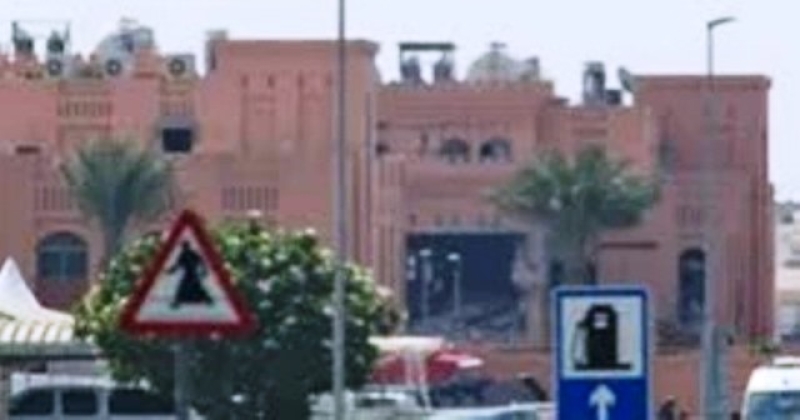- WHO Says Traditional Medicine Use Surges Worldwide |
- UN Report Calls for New Thinking to Secure a Sustainable Future |
- BNP moves to finalise seat sharing as alliance friction grows |
- BNP plans universal 'Family Card' for all women: Tarique Rahman |
- Tangail saree weaving gets recognition as intangible cultural heritage |
Arab-Islamic Summit yields limited action over Israeli strike on Doha

Doha neighbourhood hit by Israeli attack hit killing six people on Tuesday. AP Photo.
A summit of Arab and Islamic nations convened in Doha on Monday in response to Israel’s recent airstrike targeting Hamas leadership in Qatar. Despite heightened tensions and emotional appeals, the summit ended with minimal collective action as divisions among member states surfaced.
The strike — part of Israel’s broader campaign against Hamas and its allies in Iran’s “Axis of Resistance” — has sparked widespread condemnation. Many regional governments, already outraged by the reported deaths of over 64,000 Palestinians in Gaza, are questioning the strength of U.S. security commitments to Gulf states.
OIC secretary general Hissein Brahim Taha, second from left, at the emergency Arab, Islamic summit that began in Doha Qatar on Monday 15 Sept 2025
Disagreements Undermine Unity
While nations like Iran issued strong condemnations, countries maintaining diplomatic ties with Israel — including those under the Abraham Accords such as Bahrain and the UAE — hesitated to take harsher steps. Monday also marked five years since those accords were signed.
Malaysian Prime Minister Anwar Ibrahim criticized the lack of decisive action. “Words will not end the violence. Declarations will not liberate Palestine. Concrete punitive measures must be enacted,” he said.
Qatar's Emir Delivers Sharp Rebuke
Qatar’s Emir Sheikh Tamim bin Hamad Al Thani launched a scathing critique of Israel, accusing it of deliberately undermining negotiations and rendering Gaza uninhabitable.
“If Israel is intent on killing Hamas leaders, why engage in talks at all?” he asked. “If their goal is to free hostages, why are they targeting negotiators?”
He denounced Israel’s conduct in Gaza as “genocide” — a claim echoed by others at the summit but strongly denied by Israel, which blames Hamas for prolonging the war by refusing to release hostages or surrender.
Turkey, Iran Call for Economic and Diplomatic Pressure
Turkish President Recep Tayyip Erdogan advocated for increased economic pressure on Israel, arguing that previous sanctions had proven effective. Meanwhile, Iranian President Masoud Pezeshkian urged Arab and Muslim countries to isolate Israel.
Pezeshkian did not mention Iran’s June missile strike on Qatar’s Al Udeid Air Base — a response to U.S. attacks on Iranian nuclear sites — but warned that no country in the region is immune to future Israeli aggression.
Muted Outcome and Modest Commitments
Despite speculation that countries might close airspace to Israeli aircraft or downgrade diplomatic relations, the summit’s final communiqué only urged states to “pursue all legal and effective means to stop Israeli aggression against the Palestinian people.”
The six-member Gulf Cooperation Council (GCC) held a separate meeting, vowing to strengthen collective defense capabilities. No specifics were announced.
Qatar’s Mediating Role in Focus
Qatar has played a critical role as a mediator in Israel-Hamas talks and has hosted Hamas’ political office for years at Washington’s request. But its position is increasingly under pressure, particularly from Israeli hardliners.
Israeli Prime Minister Benjamin Netanyahu, reaffirming the Gaza campaign, warned that any state harboring Hamas leaders could be targeted. His remarks followed last week’s Israeli strike on Doha and intensified rhetoric from within his coalition.
U.S. Urges Restraint
U.S. Secretary of State Marco Rubio, visiting Israel on Monday, reiterated American support for ceasefire efforts and recognized Qatar’s mediating role. He was expected to travel to Doha on Tuesday to help calm tensions between the U.S.’s key regional allies.
Rubio avoided commenting on Israel’s airstrike in Qatar but emphasized the importance of regional cooperation to end the war and secure the release of hostages.
Netanyahu maintained that the decision to strike was made unilaterally by Israel.
Background and Human Toll
The war began after Hamas launched a surprise attack on southern Israel on October 7, 2023, killing approximately 1,200 people — mostly civilians — and taking 251 hostages. Israel's retaliatory campaign in Gaza has led to more than 64,000 reported deaths, according to the Hamas-run Gaza Health Ministry, which states about half of the casualties are women and children.
While Israel disputes the death toll, it has not released independent figures. The U.N. and other observers consider the Gaza ministry’s data the most reliable available. - UNB

